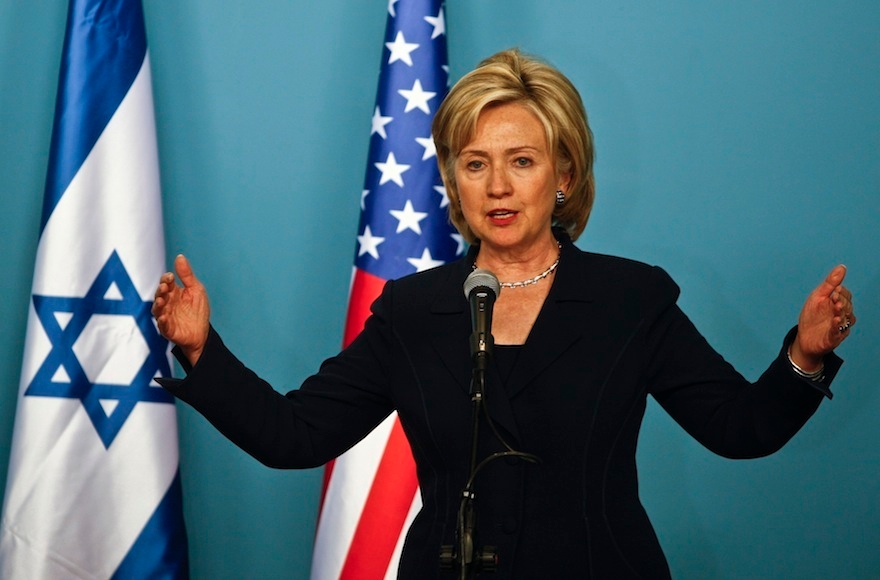Clinton makes her power to persuade Israel a selling point
Published January 26, 2016

U.S. Secretary of State Hillary Rodham Clinton speaks at a press conference with Israeli Prime Minister Benjamin Netanyahu in Jerusalem, Saturday, Oct. 31, 2009. (Dan Balilty/AP Photo)
WASHINGTON (JTA) — Hillary Rodham Clinton made her ability to talk Israel’s leadership down from military action a centerpiece of her foreign policy credentials.
ADVERTISEMENT
Clinton, appearing Monday evening at a town hall-style event at Drake University in Des Moines, Iowa, was asked to outline her foreign policy philosophy.
Two of the examples she cited were from her career as secretary of state in President Barack Obama’s first term, and both had to do with talking Israel’s government out of military action that the United States opposed.
The first example she gave had to do with the Iran nuclear deal, which she said she played a central role in shaping by garnering support for sanctions that would isolate Iran and bring it around to rolling back its nuclear program.
“You cannot imagine how tense it was because a lot of our friends and partners in the region basically just wanted to end that program by bombing them. Just bomb them. Send them back a couple of years. Just stop it,” she said. “I spent a lot of my time explaining to our friends why that was not a good idea.”
ADVERTISEMENT
There was widespread opposition to the emerging deal with Iran in the region, but the only country that has been reported as planning a bombing mission was Israel.
She noted that the Iran nuclear deal was completed, and then offered “another quick example.”
In 2012, three years after Israel’s ground war with Hamas in Gaza had roiled the region, rockets were hitting Israel again, and Israel’s anti-missile defense system, while working, was not alleviating its government’s anxieties.
“So the Israelis are telling me, ‘Look, we’ve got to go back in. We have to have a ground invasion again in Gaza’,” Clinton recalled. “I’m saying, no, please, don’t do that. Let’s try to figure out how do we resolve it.”
The Israelis resisted, and Clinton said she made an emergency visit to Israel.
“I flew from Cambodia, where I was with the president, to Israel, middle of the night, go see the Israeli cabinet, work with them on what they would accept as an offer, go see the Palestinian president, work with him to make sure he’d back it up, go back to Jerusalem, finalize the deal, fly to Cairo, meet with President [Mohamed] Morsi, the Muslim Brotherhood president of Egypt, hammer out the agreement, announce it at about an hour before the deadline that we were facing,” she said. “They got a cease-fire. There was no invasion. That’s what you have to do.”
Clinton has faced pressure from her Democratic opponents, Sen. Bernie Sanders, I-Vt., and former Maryland Gov. Martin O’Malley, for her vote as a New York senator in 2002 to authorize a U.S. invasion of Iraq. Clinton is still the front-runner nationally, but Sanders is posing a serious challenge to her in Iowa, which has its caucus voting, the first in the nation, on Feb. 1 and in New Hampshire, the next state to vote.
Sanders, appearing earlier at the event, which showcased each of the candidates separately, made his opposition to the Iraq War the centerpiece of his foreign policy credentials.
“The truth is that the most significant vote and issue regarding foreign policy that we have seen in this country in modern history was the vote on the war in Iraq,” he said.
“I voted against the war in Iraq and if you go to my website, listen to the speech that I gave when I was in the House in 2002, saying, yes, it’s easy to get rid of a dictator like Saddam Hussein, but there’s going to be a political vacuum, there will be instability,” Sanders said. “Hillary Clinton voted for the war in Iraq.”
Clinton, who says she now regrets her vote, said the United States nonetheless had little choice but to assert a leadership role in the world.
“We now live in a very interconnected world where we know everything that is going on and where people look to the United States to help,” she said. “So we have to be leading. And that means we’ve got to be smart about how we try to assert our power so that it is constructive, makes a difference and does lead to greater peace and prosperity.”
This entry passed through the Full-Text RSS service – if this is your content and you’re reading it on someone else’s site, please read the FAQ at fivefilters.org/content-only/faq.php#publishers.
















